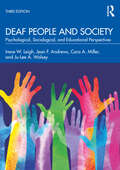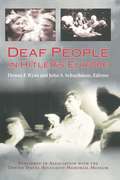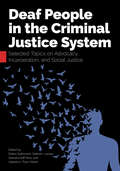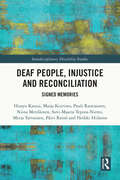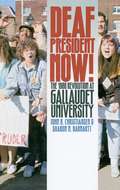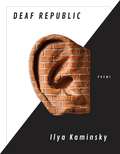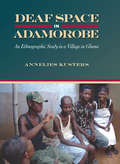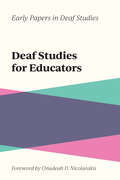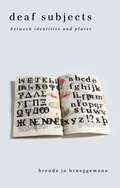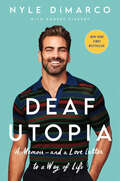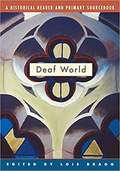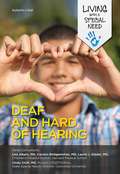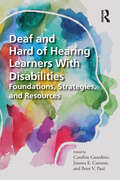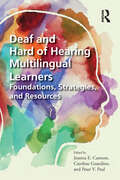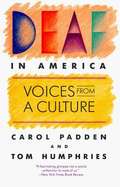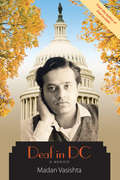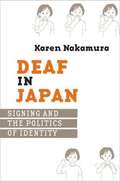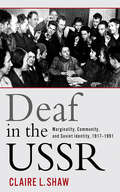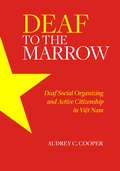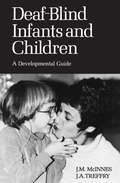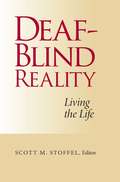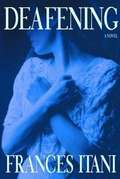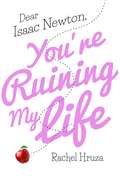- Table View
- List View
Deaf People and Society: Psychological, Sociological, and Educational Perspectives
by Irene W. Leigh Jean F. Andrews Cara A. Miller Ju-Lee A. WolseyDeaf People and Society is an authoritative text that emphasizes the complexities of being D/deaf, DeafBlind, Deaf-Disabled, or hard of hearing, drawing on perspectives from psychology, education, and sociology. This book also explores how the lives of these individuals are impacted by decisions made by professionals in clinics, schools, or other settings. This new edition offers insights on areas critical to Deaf Studies and Disability Studies, with particular emphasis on multiculturalism and multilingualism, as well as diversity, equity, and inclusion. Accessibly written, the chapters include objectives and suggested further reading that provides valuable leads and context. Additionally, these chapters have been thoroughly revised and incorporate a range of relevant topics including etiologies of deafness; cognition and communication; bilingual, bimodal, and monolingual approaches to language learning; childhood psychological issues; psychological and sociological viewpoints of deaf adults; the criminal justice system and deaf people; psychodynamics of interaction between deaf and hearing people; and future trends. The book also includes case studies covering hearing children of deaf adults, a young deaf adult with mental illness, and more.Written by a seasoned D/deaf/hard of hearing and hearing bilingual team, this unique text continues to be the go-to resource for students and future professionals interested in working with D/deaf, DeafBlind, and hard-of-hearing persons. Its contents will resonate with anyone interested in serving and enhancing their knowledge of their lived experiences of D/deaf, DeafBlind, Deaf-Disabled, and hard-of-hearing people and communities.
Deaf People in Hitler's Europe
by John S. Schuchman Donna F. RyanInspired by the conference "Deaf People in Hitler's Europe, 1933-1945," hosted jointly by Gallaudet University and the United States Holocaust Memorial Museum in 1998, this extraordinary collection, organized into three parts, integrates key presentations and important postconference research. Henry Friedlander begins "Part I: Racial Hygiene" by analyzing the assault on deaf people and people with disabilities as an integral element in the Nazi attempt to implement their theories of racial hygiene. Robert Proctor documents the role of medical professionals in deciding who should be sterilized or forbidden to marry, and whom the Nazi authorities would murder. In an essay written especially for this volume, Patricia Heberer details how Nazi manipulation of eugenics theory and practice facilitated the justification for the murder of those considered socially undesirable. "Part II: The German Experience" commences with Jochen Muhs's interviews of deaf Berliners who lived under Nazi rule, both those who suffered abuse and those who, as members of the Nazi Party, persecuted others, especially deaf Jews. John S. Schuchman describes the remarkable 1932 film Misjudged People, which so successfully portrayed the German deaf community as a vibrant contributor to society that the Nazis banned its showing when they came to power. Horst Biesold's contribution confirms the complicity of teachers who denounced their own students, labeling them hereditarily deaf and thus exposing them to compulsory sterilization. The section also includes the reprint of a chilling 1934 article entitled "The Place of the School for the Deaf in the New Reich," in which author Kurt Lietz rued the expense of educating deaf students, who could not become soldiers or bear "healthy children." In "Part III: The Jewish Deaf Experience," John S. Schuchman discusses the plight of deaf Jews in Hungary. His historical analysis is complemented by a chapter containing excerpts from the testimony of six deaf Jewish survivors who describe their personal ordeals. Peter Black's reflections on the need for more research conclude this vital study of a little-known chapter of the Holocaust.
Deaf People in the Criminal Justice System: Selected Topics on Advocacy, Incarceration, and Social Justice
by Debra Guthmann Gabriel I. Lomas Damara Goff Paris Gabriel A. “Tony” MartinThe legal system is complex, and without appropriate access, many injustices can occur. Deaf people in the criminal justice system are routinely denied sign language interpreters, videophone access, and other accommodations at each stage of the legal process. The marginalization of deaf people in the criminal justice system is further exacerbated by the lack of advocates who are qualified to work with this population. Deaf People in the Criminal Justice System: Selected Topics on Advocacy, Incarceration, and Social Justice is the first book to illuminate the challenges faced by deaf people when they are arrested, incarcerated, or navigating the court system. This volume brings interdisciplinary contributors together to shed light on both the problems and solutions for deaf people in these circumstances. The contributors address issues such as accessibility needs; gaps regarding data collection and the need for more research; additional training for attorneys, court personnel, and prison staff; the need for more qualified sign language interpreters, including Certified Deaf Interpreters who provide services in court, prison, and juvenile facilities; substance use disorders; the school to prison nexus; and the need for advocacy. Students in training programs, researchers, attorneys, mental health professionals, sign language interpreters, family members, and advocates will be empowered by this much-needed resource to improve the experiences and outcomes for deaf people in the criminal justice system.
Deaf People, Injustice and Reconciliation: Signed Memories (Interdisciplinary Disability Studies)
by Hisayo Katsui Heikki Hiilamo Maija Koivisto Pauli Rautiainen Niina Meriläinen Suvi-Maaria Tepora-Niemi Merja Tarvainen Päivi RainoThis book focuses on injustices that have taken place to deaf people and the sign language community in Finland from 1900.For decades, memories and stories about past injustices have been passed down from one generation to another among deaf people and the sign language community. This research explains this history from the perspective of deaf people and their community and contributes to the truth and reconciliation process of the Finnish Government with the community, which is globally the first of its kind.Using participatory research methods, it is relevant for Disability Studies, Social Work, and Human Rights Studies, Political Science and History.
Deaf President Now!: The 1988 Revolution at Gallaudet University
by Sharon N. Barnartt John B. ChristiansenDeaf President Now! reveals the groundswell leading up to the history-making week in 1988 when the students at Gallaudet University seized the campus and closed it down until their demands were met. To research this probing study, the authors interviewed in-depth more than 50 of the principal players. This telling book reveals the critical role played by a little-known group called the "Ducks," a tight-knit band of six alumni determined to see a deaf president at Gallaudet. Deaf President Now! details how they urged the student leaders to ultimate success, including an analysis of the reasons for their achievement in light of the failure of many other student movements. This fascinating study also scrutinizes the lasting effects of this remarkable episode in "the civil rights movement of the deaf." Deaf President Now! tells the full story of the insurrection at Gallaudet University, an exciting study of how deaf people won social change for themselves and all disabled people everywhere through a peaceful revolution.
Deaf Republic: Poems
by Ilya KaminskyFinalist for the National Book Award • Finalist for the PEN/Jean Stein Award • Finalist for the National Book Critics Circle Award • Winner of the Los Angeles Times Book Prize • Winner of the Anisfield-Wolf Book Award • Winner of the National Jewish Book Award • Finalist for the Kingsley Tufts Poetry Award • Finalist for the T. S. Eliot Prize • Finalist for the Forward Prize for Best CollectionIlya Kaminsky’s astonishing parable in poems asks us, What is silence?Deaf Republic opens in an occupied country in a time of political unrest. When soldiers breaking up a protest kill a deaf boy, Petya, the gunshot becomes the last thing the citizens hear—they all have gone deaf, and their dissent becomes coordinated by sign language. The story follows the private lives of townspeople encircled by public violence: a newly married couple, Alfonso and Sonya, expecting a child; the brash Momma Galya, instigating the insurgency from her puppet theater; and Galya’s girls, heroically teaching signing by day and by night luring soldiers one by one to their deaths behind the curtain. At once a love story, an elegy, and an urgent plea, Ilya Kaminsky’s long-awaited Deaf Republic confronts our time’s vicious atrocities and our collective silence in the face of them.
Deaf Space in Adamorobe: An Ethnographic Study in a Village in Ghana
by Annelies KustersShared signing communities consist of a relatively high number of hereditarily deaf people living together with hearing people in relative isolation. In the United States, Martha's Vineyard gained mythical fame as a paradise for deaf people where everyone signed up until the 19th century. That community disappeared when deaf people left the island, newcomers moved in, married locals, and changed the gene pool. These unique communities still exist, however, one being the Akan village in Ghana called Adamorobe. Annelies Kusters, a deaf anthropologist, traveled to Adamorobe to conduct an ethnographic study of how deaf and hearing people live together in the village. In her new book, Kusters reveals how deaf people in Adamorobe did not live in a social paradise and how they created "deaf spaces" by seeking each other out. Deaf Space in Adamorobe reveals one example of the considerable variation in shared signing communities regarding rates of sign language proficiency and use, deaf people's marriage rates, deaf people's participation in village economies and politics, and the role of deaf education. Kusters describes spaces produced by both deaf and hearing people as a cohesive community where living together is an integral fact of their sociocultural environments. At the same time, Kusters identifies tension points between deaf and hearing perspectives and also between outside perspectives and discourses that originated within the community. Because of these differences and the relatively high number of deaf people in the community, Kusters concludes it is natural that they form deaf spaces within the shared space of the village community.
Deaf Studies for Educators (Early Papers in Deaf Studies #2)
by Onudeah D. NicolarakisAs Deaf Studies emerged in the 1970s and 1980s as a field of academic study and inquiry, the importance of Deaf Studies in education became an area of interest among thought leaders of the time. Deaf Studies for Educators is a collection of papers from a 1991 conference convened to explore Deaf Studies as a framework for teaching and learning. American Sign Language literature and poetry, bilingual and bicultural programs, arts and history, and deaf identity are several of the topics covered. This collection captures how educators understood early on the benefits of a curriculum that was more fully inclusive and reflective of deaf culture and deaf experiences. A foreword by Onudeah D. Nicolarakis contextualizes the work for modern audiences. This is the second volume in the Early Papers in Deaf Studies series, which consists of reissued works originally published by the Gallaudet University College for Continuing Education but long out of print. The aim of this series is to restore these foundational papers to the scholarly community. Deaf Studies for Educators is available in both print and open digital formats, ensuring broad access to this important contribution to the literature.
Deaf Subjects: Between Identities and Places (Cultural Front #12)
by Brenda Jo BrueggemannIn this probing exploration of what it means to be deaf, Brenda Brueggemann goes beyond any simple notion of identity politics to explore the very nature of identity itself. Looking at a variety of cultural texts, she brings her fascination with borders and between-places to expose and enrich our understanding of how deafness embodies itself in the world, in the visual, and in language.Taking on the creation of the modern deaf subject, Brueggemann ranges from the intersections of gender and deafness in the work of photographers Mary and Frances Allen at the turn of the last century, to the state of the field of Deaf Studies at the beginning of our new century. She explores the power and potential of American Sign Language—wedged, as she sees it, between letter-bound language and visual ways of learning—and argues for a rhetorical approach and digital future for ASL literature.The narration of deaf lives through writing becomes a pivot around which to imagine how digital media and documentary can be used to convey deaf life stories. Finally, she expands our notion of diversity within the deaf identity itself, takes on the complex relationship between deaf and hearing people, and offers compelling illustrations of the intertwined, and sometimes knotted, nature of individual and collective identities within Deaf culture.
Deaf Utopia: A Memoir—and a Love Letter to a Way of Life
by Nyle DiMarco Robert SiebertA heartfelt and inspiring memoir and celebration of Deaf culture by Nyle DiMarco, actor, producer, two-time reality show winner, and cultural icon of the international Deaf communityBefore becoming the actor, producer, advocate, and model that people know today, Nyle DiMarco was half of a pair of Deaf twins born to a multi-generational Deaf family in Queens, New York. At the hospital one day after he was born, Nyle “failed” his first test—a hearing test—to the joy and excitement of his parents.In this engrossing memoir, Nyle shares stories, both heartbreaking and humorous, of what it means to navigate a world built for hearing people. From growing up in a rough-and-tumble childhood in Queens with his big and loving Italian-American family to where he is now, Nyle has always been driven to explore beyond the boundaries given him. A college math major and athlete at Gallaudet—the famed university for the Deaf in Washington, DC—Nyle was drawn as a young man to acting, and dove headfirst into the reality show competitions America’s Next Top Model and Dancing with the Stars—ultimately winning both competitions.Deaf Utopia is more than a memoir, it is a cultural anthem—a proud and defiant song of Deaf culture and a love letter to American Sign Language, Nyle’s primary language. Through his stories and those of his Deaf brothers, parents, and grandparents, Nyle opens many windows into the Deaf experience.Deaf Utopia is intimate, suspenseful, hilarious, eye-opening, and smart—both a memoir and a celebration of what makes Deaf culture unique and beautiful.
Deaf World: A Historical Reader and Primary Sourcebook
by Lois BraggTo many who hear, the deaf world is as foreign as a country never visited. Deaf World thus concerns itself less with the perspectives of the hearing and more with what Deaf people themselves think and do. Editor Lois Bragg asserts that English is for many signing people a second, infrequently used language and that Deaf culture is the socially transmitted pattern of behavior, values, beliefs, and expression of those who use American Sign Language. She has assembled an astonishing array of historical sources, political writings, and personal memoirs, from classic 19th-century manifestos to contemporary policy papers, on everything from eugenics to speech and lipreading, the right to work and marry, and the never-ending controversy over separation vs. social integration. At the heart of many of the selections lies the belief that Deaf Americans have long constituted an internal colony of sorts in the United States. While not attempting to speak for Deaf people en masse, this ambitious platform anthology places the Deaf on center stage, offering them an opportunity to represent the world--theirs as well as the hearing world--from a Deaf perspective. For Deaf readers, the book will be welcomed as a gift, both a companion to be savored and, as often, an opponent to be engaged and debated. And for the hearing, it serves as an unprecedented guide to a world and a culture so often overlooked. Comprising a judicious mix of published pieces and original essays solicited specifically for this volume, Deaf World marks a major contribution.
Deaf and Hard of Hearing
by Autumn LibalIn a world where most educational and social systems are designed for people who can hear, being deaf or hard of hearing presents young people with a unique set of challenges. They must find ways to communicate and overcome discrimination. In this book you will read about Denzel, who has never missed being able to hear. He was born deaf, and the idea of "sound" is confusing to him. As you follow Denzel's journey through a world designed for the hearing, you'll see him find ways to overcome the challenges of communicating with others. Being deaf doesn't have to be a handicap--and it won't keep Denzel from exploring, learning, or accomplishing his dreams!
Deaf and Hard of Hearing Learners With Disabilities: Foundations, Strategies, and Resources
by Peter V. Paul Caroline Guardino Joanna E. CannonThis volume offers foundational information and research-based strategies for meeting the needs of deaf and hard of hearing learners with disabilities. The disabilities covered in this volume include developmental delays, autism spectrum disorder, intellectual and learning disabilities, deafblindness, emotional and behavioral disorders, attention deficit hyperactivity disorder, and a variety of high incidence syndromes. Contributors examine the literature within each disability category, share best practices, and consider demographics/characteristics, intervention/identification, placement, communication/language, psychosocial issues, assistive technologies/accommodations, assessments, and transition/post-secondary outcomes. Each chapter begins with learning objectives and concludes with discussion questions and a resource list. Deaf and Hard of Hearing Learners with Disabilities is an essential book for courses at the undergraduate and graduate level, and in workshops and webinars for in-service teachers, professionals, and families.
Deaf and Hard of Hearing Multilingual Learners: Foundations, Strategies, and Resources
by Peter V. Paul Caroline Guardino Joanna E. CannonThis critical resource provides foundational information and practical strategies for d/Deaf or hard of hearing (d/Dhh) multilingual learners. These learners come from backgrounds where their home languages differ from the dominant spoken or sign languages of the culture. This book is a one-stop resource for professionals, interventionists, and families, helping them to effectively support the diverse needs of d/Dhh multilingual learners by covering topics such as family engagement, assessment, literacy, multiple disabilities, transition planning, and more. The book provides vignettes of learners from 25 countries, discussion questions, and family-centered infographic briefs that synthesize each chapter. Deaf and Hard of Hearing Multilingual Learners is a groundbreaking step towards better supporting the many languages and cultures d/Dhh students experience in their lifetimes through strength-based and linguistically responsive approaches.
Deaf in America
by Tom Humphries Carol PaddenWritten by authors who are themselves Deaf, this unique book illuminates the life and culture of Deaf people from the inside, through their everyday talk, their shared myths, their art and performances, and the lessons they teach one another. Padden and Humphries employ the capitalized "Deaf" to refer to deaf people who share a natural language--American Sign Language (ASL)--and a complex culture, historically created and actively transmitted across generations. Signed languages have traditionally been considered to be simply sets of gestures rather than natural languages. This mistaken belief, fostered by hearing people's cultural views, has had tragic consequences for the education of deaf children; generations of children have attended schools in which they were forbidden to use a signed language. For Deaf people, as Padden and Humphries make clear, their signed language is life-giving, and is at the center of a rich cultural heritage. The tension between Deaf people's views of themselves and the way the hearing world views them finds its way into their stories, which include tales about their origins and the characteristics they consider necessary for their existence and survival. Deaf in America includes folktales, accounts of old home movies, jokes, reminiscences, and translations of signed poems and modern signed performances. The authors introduce new material that has never before been published and also offer translations that capture as closely as possible the richness of the original material in ASL. Deaf in America will be of great interest to those interested in culture and language as well as to Deaf people and those who work with deaf children and Deaf people.
Deaf in DC: A Memoir
by Madan VasishtaIn his first memoir, Madan Vasishta described being a deaf boy in his homeland India, where "deaf" meant someone who is not human. After rising from herding cattle to being a respected photographer in Delhi, his first memoir concluded with his acceptance at Gallaudet College far away in America. Vasishta's new memoir begins with his arrival in Washington, DC in 1967 with $40.00 in his pocket and very little knowledge of the new worlds he was entering. Vasishta faced myriad challenges from the outset-- he knew no American Sign Language and could not speech read, yet he found himself thrust into classes at Gallaudet two weeks into the semester. Cultural differences mystified him, such as how all American car accidents were someone else's fault even when one's car hits a stationary object. He was amazed that his fellow students did not deride him for his mistakes, unlike in India where he would have been scorned for his weakness. After five years, he returned home to India for a visit and was stunned to learn that he no longer fit in, that "even if you do not have an American Dream, the American Dream will have you." Deaf in DC follows Vasishta through half a century living in America. He witnessed the transformation from facing bias as a deaf, foreign man of color who could not get a job despite having a Ph.D., to receiving five offers as a school superintendent in the wake of the Civil Rights movement and Deaf President Now. His new memoir reflects a genuine worldview informed by the sage perceptions of a person who has lived widely in many worlds.
Deaf in Japan: Signing and the Politics of Identity
by Karen NakamuraUntil the mid-1970s, deaf people in Japan had few legal rights and little social recognition. Legally, they were classified as minors or mentally deficient, unable to obtain driver's licenses or sign contracts and wills.
Deaf in the USSR: Marginality, Community, and Soviet Identity, 1917-1991
by Claire L. ShawIn Deaf in the USSR, Claire L. Shaw asks what it meant to be deaf in a culture that was founded on a radically utopian, socialist view of human perfectibility. Shaw reveals how fundamental contradictions inherent in the Soviet revolutionary project were negotiated—both individually and collectively— by a vibrant and independent community of deaf people who engaged in complex ways with Soviet ideology.Deaf in the USSR engages with a wide range of sources from both deaf and hearing perspectives—archival sources, films and literature, personal memoirs, and journalism—to build a multilayered history of deafness. This book will appeal to scholars of Soviet history and disability studies as well as those in the international deaf community who are interested in their collective heritage. Deaf in the USSR will also enjoy a broad readership among those who are interested in deafness and disability as a key to more inclusive understandings of being human and of language, society, politics, and power.
Deaf to the Marrow: Deaf Social Organizing and Active Citizenship in Viet Nam
by Audrey C. CooperIn Deaf to the Marrow, public anthropologist Audrey C. Cooper examines the social production and transformation of ideas about language, bodies, and state-structured educational institutions in southern Viet Nam. Focusing on the reform period (1986 to the present), Cooper describes the ways that signed-language practices, ideologies, policies, and programming shape and are shaped by Deaf people’s social engagement in and around Ho Chí Minh City. Drawing on research data and work with Vietnamese Deaf colleagues covering an eight-year span, Cooper develops ethnographic and language-centered accounts of Deaf social organizing. These accounts illuminate the ways that Deaf citizens are assuming self-determining roles, or active citizenship, in decisions of local, national, and international importance. By placing Deaf social action in the historical context of state development and modernization projects, Cooper shows how educational structuring reflects dominant, spoken-language-centered views of Vietnamese Deaf people and signed languages. She also addresses the impact of international aid agendas on education, especially those related to disability. Deaf to the Marrow examines perspectives largely ignored in Deaf education, Deaf studies, signed-language linguistics, and anthropological literatures, thereby contributing to scholarship on language and sociopolitical formation broadly and the study of Deaf people’s citizenship practices specifically.
Deaf-Blind Infants and Children
by John Mcinnes J. A. TreffryThis is a comprehensive reference guide for teachers, parents, and paraprofessionals working or living with children who are both deaf and blind. It provides day-to-day guidance and suggestions about techniques and methods for assessing children with multi-sensory deprivation, and for devising programs to help them cope.
Deaf-Blind Interpreting Workbook: Student Readings and Worksheets
by Mary Bauer Karen Chriest Stueland Jackie Engler-Morris Janie Neal Jelica Nuccio Cynthia WallaceThis workbook was put together to cover basic Deaf-Blind interpreting techniques. Over the past years, the Seattle Deaf-Blind Community has shaped this class and the workbook has evolved.
Deaf-Blind Reality: Living the Life
by Scott M. StoffelMost stories about disabled people are written for the sake of being inspirational. These stories tend to focus on some achievement, such as sports or academics, but rarely do they give a true and complete view of the challenges individuals must deal with on a daily basis. For example: How does a deaf-blind person interact with hearing-sighted people at a family reunion? How does she shop for groceries? What goes through his mind when he enters a classroom full of non-handicapped peers? These aren't questions you are likely to find answers to while reading that incredible tale of success. They are, however, issues that a deaf-blind person wishes others understood. Deaf-Blind Reality: Living the Life explores what life is really like for persons with a combination of vision and hearing loss, and in a few cases, other disabilities as well. Editor Scott M. Stoffel presents extensive interviews with 12 deaf-blind individuals, including himself, who live around the world, from Missouri to New Zealand, Louisiana to South Africa, and Ohio to England. These contributors each describe their families' reactions and the support they received; their experiences in school and entering adulthood; and how they coped with degeneration, ineffective treatments, and rehabilitation. Each discusses their personal education related to careers, relationships, and communication, including those with cochlear implants. Deaf-Blind Reality offers genuine understanding of the unspectacular but altogether daunting challenges of daily life for deaf-blind people.
Deafening
by Frances ItaniThis novel interweaves the lives of its two main characters - Grania, deaf since age five; and her husband Jim, who serves as a medic on the battlefields of World War I. The story begins with Grania's childhood in a small Canadian town, and her years at a residential school for the deaf. Her relationships within her family are portrayed with insight and depth. Jim leaves for Europe two weeks after his marriage to Grania, and much of the book involves his horrifying experience of the war. The author based Grania's character on her own grandmother, who was deaf, and has done extensive research on both deaf history and the social history of the World War I era. This is an absorbing novel and gives a refreshingly rounded depiction of a woman with a disability.
Dear Isaac Newton, You're Ruining My Life
by Rachel HruzaAs if seventh grade isn't hard enough, Truth Trendon learns she has to wear a back brace to help her worsening scoliosis. She decides gravity is to blame for curving her spine and ruining her life. Thanks for nothing, Isaac Newton!Truth's brace is hard plastic, tight, and uncomfortable. She has to wear a t-shirt under it and bulky clothes over it, making her feel both sweaty and unfashionable. She's terrified that her classmates are going to find out about it. But it's hard keeping it a secret (especially when gym class is involved), and secrets quickly turn into lies. When Truth's crush entrusts her with a big secret of his own, it leads to even more lying. Add to that a fight with her best friend, a looming school-wide presentation, and mean rumors, and it's a recipe for disaster. As Truth navigates the ups and downs of middle school, can she learn to accept her true self, curvy spine and all?
Dear Kilroy: A Dog to Guide Us
by Nora Vitz HarrisonFrom the Book Jacket: Dear Kilroy reminds us that some of the best teachers in this world have four legs and bark. Nora Vitz Harrison weaves the tender and wise humor of Kilroy and Riley, two canine correspondents, among heart-tugging essays on the magical relationship between people and dogs. The true-life stories follow a few special dogs and the human lives they change. The loss of a loved one or a relentless disease are made more bearable with a tail-wagging companion. Even if you have never been owned by a dog, you will be moved by this joyful yet bittersweet guide to life. NORA VITZ Harrison is a long time volunteer for Guide Dogs for the Blind and active in animal-welfare organizations. She has been a writer for corporate America since 1979. Her human-interest essays have appeared in The Oregonian newspaper and other publications. She lives in Oregon with her husband, Jon, and her dog, Riley. When she is not writing, she loves to hike, which is Riley's favorite hobby, too. Find out more about Nora and her canine friends at www.dearkilroy.com "The author of this lovely book is well aware of that spot deep within us that sometimes only dogs can find. The dogs in these stories touch that spot and make it glow." - Betty White actress/author 'As the dogs in Dear Kilroy strive to fulfill their potential, whether to become a guide for the blind or to become the best, most-trusted pet of someone in need, they inspire us to become better human beings. This book will lift your spirits and touch your soul." - Bob Phillips, CEO Guide Dogs for the Blind 'Harrison's delightful book reminds us that dogs serve as guides to the sighted as well as the blind. Open this book and your heart be opened, too." - Nancy Peterson The Humane Society of the United States
